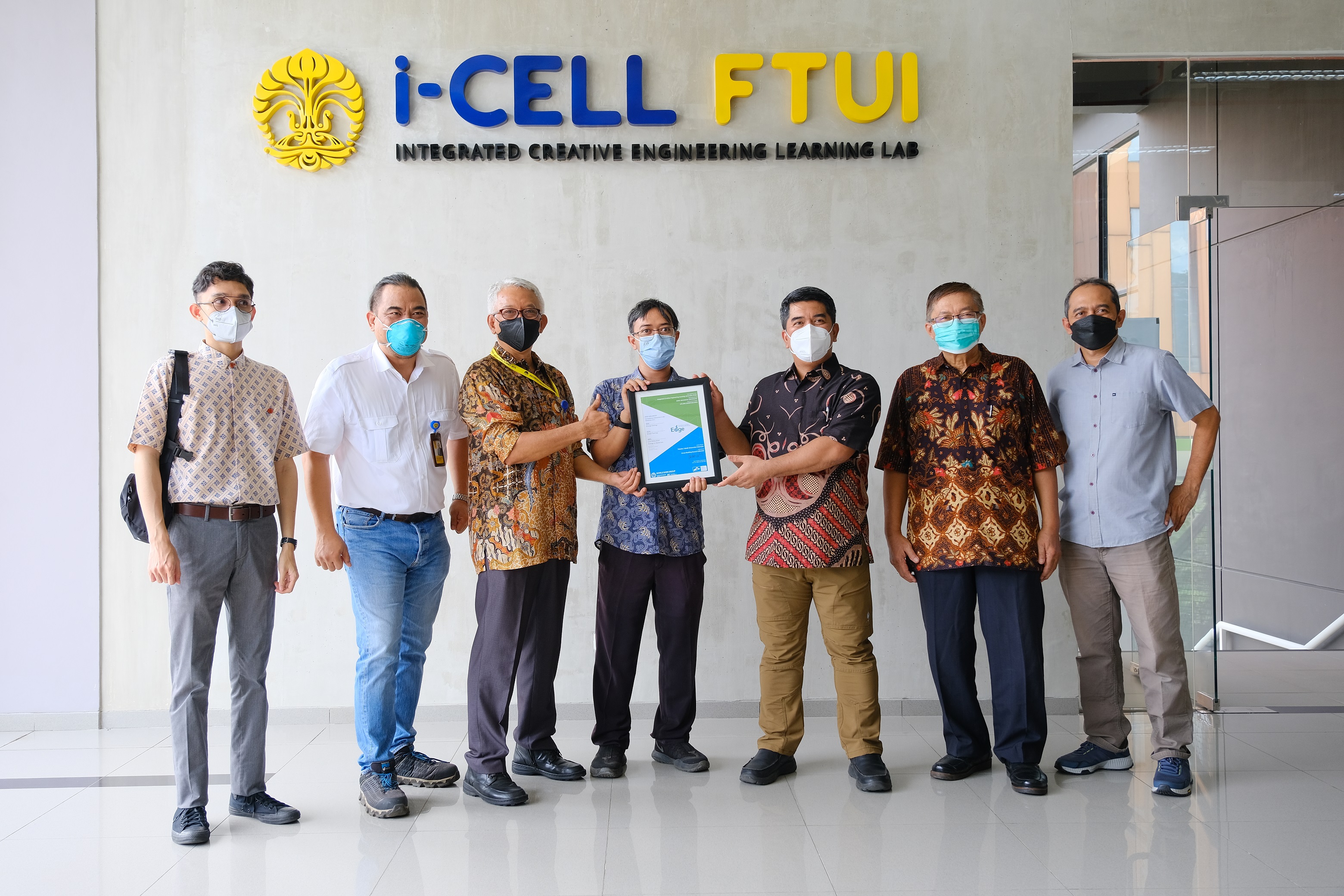From data disclosed by the Intergovernmental Panel on Climate Change (IPCC), it is estimated that buildings consume more than a third of the world’s resources, 12% of the total available clean water, and account for nearly 40% of total emissions on earth. The i-CELL FTUI building has proven to be successful in reducing energy savings by up to 70%, water savings by 42%, and energy savings from materials used by 48%. This fact is stated in the EDGE Advanced i-CELL certification of the Faculty of Engineering, Universitas Indonesia (FTUI) which was issued on March 2, 2022.
The FTUI Integrated Creative Engineering Learning Laboratory (i-CELL) building which was inaugurated in September 2021, received the EDGE Advanced (Excellence in Design for Greater Efficiencies) certification from the Green Building Council Indonesia. EDGE certification is divided into three categories based on proven energy, water and material savings, EDGE Certified (20% savings), EDGE Advanced (40% savings) and Zero Carbon (100% savings). This prestigious certification is a green building certification that is given to buildings that are judged to be successful at achieving a minimum of 40% for energy efficiency and conservation, water conservation, and energy conservation from these building materials.
Energy savings are achieved through the use of energy-efficient lamps, on-grid installation of 101 kWp PV Solar Panels on the roof top of the building which is capable of generating 30% of electrical energy for the building, and integrated control of the use of electrical power in the building. Water saving is done through a rain water harvesting system where rainwater is collected and utilized to support building operational activities by going through a filtering process. Energy savings from the materials used are carried out by using materials that in the manufacturing process produce a minimal carbon footprint.
The i-CELL FTUI building was initiated and completed during the leadership period of the 2018-2022 FTUI Dean, Dr. Ir. Hendri D.S. Budiono, M.Eng. “The construction of the i-CELL building is FTUI’s effort to create and unite an integrated, comfortable, and modern educational laboratory at FTUI. This interdisciplinary laboratory building is also designed as a form of implementing a green laboratory building that is free of carbon emissions,” said Dr. Hendri.
The Dean of FTUI (2022-2026), Prof. Dr. Heri Hermansyah, S.T., M.Eng., IPU., expressed his appreciation for this achievement, and said, “UI and FTUI have proven their commitment to preserving Indonesia’s earth. This is in line with the commitment of the Indonesian government regarding Green Buildings or BGH as a form of action to reduce greenhouse gas emissions caused by building management”.
In UI, i-CELL is the second building that has succeeded in obtaining EDGE certification from the Green Building Council Indonesia, after the Student Activity Center Building (PUSGIWA) in 2019. i-CELL is an integrated laboratory building designed with smart and green building technology that environmentally friendly and efficient in lighting energy management, air circulation, and applying rain water harvesting technology. It is the work of Indonesian architects who are also professors and young lecturers from the Department of Architecture, namely Prof. Yandi Andri Yatmo, ST, M.Arch., Ph.D., Mikhael Johanes, S. Ars., M.Ars., Arif Rahman Wahid, S.Ars., MA, and Mochammad Mirza Yusuf Harahap, S.Ars. , M.Des.
The construction of the 8-storey building with 1 roof top was initiated by a project team under the leadership of a professor and lecturer of FTUI, Prof. Dr.-Ing. Nandy Putra and Dr. Dwi Marta Nurjaya, S.T., M.T. as the project implementing team, Prof. Dr. Ir. Yuskar Lase, DEA. as a structural expert, Dr. Ir. Budihardjo, Dipl.-Ing. as an electrical mechanical expert, Ir. Setyo Supriyadi Supadi, M.Sc. as a designer consultant coordinator, and LEMTEK UI as a design consulting and supervisory agency. The building on a land area of 8,410 square meters is FTUI’s answer to the challenges in the field of science and technology in the future, especially in increasing the number and quality of research, as well as an effort to realize UI as a World Class Research University.
***
Public Communication Bureau
Faculty of Engineering, Universitas Indonesia

